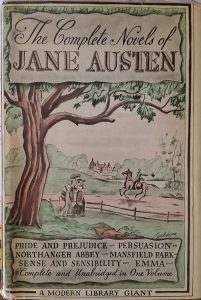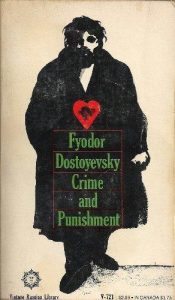As a child I was a voracious reader, devouring all the book series that were popular at that time — The Bobbsey Twins, Nancy Drew, Cherry Ames, Sue Barton, and Honey Bunch and Norman. Of these five, the only one that seems to have survived is Nancy Drew. Maybe a girl detective has more staying power than a family with two sets of twins (the Bobbseys), a nurse (both Cherry Ames and Sue Barton), or a little girl and her mischievous playmate (Honey Bunch and Norman).
My oldest sister, seven years older than I and soon to be on her way to Radcliffe, was worried that I was wasting my time reading and re-reading these silly books, and urged my mother to take them away from me so that I would read better literature. My mother, a woman of infinite wisdom, refused to take her advice, and I only found out about this discussion years later. So I was able to read Nancy Drew and The Ringmaster’s Secret as many times as I wanted. I still had plenty of time and energy to read other books of all sorts.
In the bedroom that my two sisters shared, there was a floor-to-ceiling bookcase with a wide variety of books in it all jumbled together in no particular order. One entire shelf was devoted to the World Book Encyclopedia, and I would often take out a volume and just start reading articles in it. I learned all kinds of interesting things that way. I would also look there for books to read when I wanted to take a break from Nancy and the others — my own in-house library. At the end of the summer before seventh grade, when I had just come home from music camp and was looking for something new, a book called Crime and Punishment caught my eye. I didn’t know it was famous, or difficult, or way above my grade level, so I just began reading it and was captivated.
That fall I started seventh grade in a new school, in a different town, with kids I had never met before, and with different teachers and classrooms for each subject. All dramatically different from my easy, comfortable sixth grade life of the previous year. It was a little intimidating, to say the least. On the first day of English class, the teacher went around the room and had each student say what he/she was reading. Most were pretty standard — Heidi, Little Women, Prisoner of Zenda, etc. There was one boy, Scott, who was reading The Communist Manifesto, and the teacher seemed impressed by that. When he got to me and I said Crime and Punishment, he was flabbergasted. First he asked who the author was, thinking, I suppose, that it might be some other Crime and Punishment. I said Dostoevsky. Then he started asking me questions about the plot, which I answered correctly. When he was finally convinced that I really was reading it, and that I understood what I was reading, he moved on to the next person. But I was definitely the teacher’s pet in that class for the entire year. And not only that. Word spread throughout the English Department, and I would have to say that all my English teachers for the next six years treated me with great respect.
I enjoyed the book when I read it, and that spring I went on to read The Brothers Karamazov because I was interested in reading something else by the same author, but I wouldn’t say that C&P was a book that I loved, or wanted to read again and again. In fact, when I went online and read a plot synopsis before writing this story, many of the characters and plot elements didn’t even sound familiar. In fairness, it was about 55 years ago that I read it, but I still would have expected to remember more.
Probably my all-time favorite novel, which I have read countless times and it never loses its charm, is Pride and Prejudice. I love all six of Jane Austen’s novels, but P&P is definitely the one I turn to most often. I have also read numerous books by modern authors attempting to chronicle what comes after the novel ends — the married life of Elizabeth and Darcy. They are generally terrible, but that doesn’t dissuade me from reading yet one more when I see them at the library. I am so attached to Elizabeth and Darcy that it would be great to know how the rest of their lives turned out, if only someone of Austen’s caliber were around to write it. Certainly if I were packing for the proverbial desert island, my copy of The Complete Novels of Jane Austen is one of the first things I would grab.
 The lovely edition pictured here was given to me by my college boyfriend, with the inscription “To Suzy, after two years, with love. ‘Everything nourishes what is strong already.'” The quote is something Elizabeth Bennet says in chapter 9 of P&P, and I wonder now if he read the book looking for a suitable quote. In those days you couldn’t just google “quote from Jane Austen about love” and come up with something appropriate. Maybe some day I will have the chance to ask him and see if he remembers.
The lovely edition pictured here was given to me by my college boyfriend, with the inscription “To Suzy, after two years, with love. ‘Everything nourishes what is strong already.'” The quote is something Elizabeth Bennet says in chapter 9 of P&P, and I wonder now if he read the book looking for a suitable quote. In those days you couldn’t just google “quote from Jane Austen about love” and come up with something appropriate. Maybe some day I will have the chance to ask him and see if he remembers.
.




Well, Suzy, I just found “The Mystery at Lilac Inn” (Nancy Drew Mystery Stories) in my basement…my husband keeps urging me to purge my book collection and I keep resisting, and I too was a World Book Encyclopedia reader, but I never got to Dostoevsky, EVER! Kudos to you. And I’ve loved all the movie versions of Jane Austen (particularly “Pride and Prejudice”), but confess, I have never read any, though I’m sure I would love them if I did. My eyes are so bad, I don’t read much now, so can’t really go back to it. Everything is a blur. But I admire your choices.
Sorry to hear about your blurry vision, Betsy. Have you tried listening to audible books? I have friends who actually like that better than reading them.
My parents gave away all my Nancy Drews when they sold the house I grew up in and moved to a retirement community. I was heartbroken, as I wanted to share them with my eventual daughters. Did you know that all the old books were revised in the ’60s to make them shorter and IMO dumber? So the originals (Vols. 1-34) are collector’s items now! Don’t purge your collection!
This is really a terrific story; especially since I expected a recitation of “the usual suspects” in children’s literature from our era — and I am no exception to that reading list. Instead, you bowl us over with C & P, which is itself a stereotype of the “Well, I’ve tried to get through it about a dozen times, but…” and yet you actually read it in its entirety. No wonder you became your English teacher’s pet and your reputation spread throughout the department.
That copy of Jane Austen’s novels is beautiful, and reminded me that she only wrote six novels. And you definitely need to follow up with your besotted bestower and find out how he found that lovely P & P quotation. (Not to be an un-romantic, but Bartlett’s would have been a pre-Google alternative to reading the whole novel.) That can be the subject of a later story….
Thanks, John. And you’re right, of course, he could have looked in Bartlett’s. I imagine that IS what he did. How could I have forgotten Bartlett’s?
What a vivid set of literary recollections. You do capture the past so well in these posts. I love hearing after-the-fact that your mother persevered in protecting your precious pulp pubs! What a great scene that must have been, all the while you up in your room, following Nancy Drew’s exploits.
I can relate to discovering darkness. In seventh grade I was beginning to look for and feel the dark side and I’m wondering if — beyond its grim title — you were drawn into Raskolnikov’s garreted existence. I know we rarely do, at that age, but I’m hoping you got a tingle of revenge when you could answer your flabbergasted teacher’s questions about the plot.
I just read P & P again, very recently. I didn’t read it early on because it was a GIRL’s book [!] and I wonder how more socially canny I would have been if I could have enjoyed Austen’s sharp social observations at an early age.
I also leafed through the gigantic row of Britannicas we had over the sofa. I remember being fascinated by so many random perusals. Thanks for bringing me back to all that solitary delight!
Thanks for your comments. No tingle of revenge, I was just very matter-of-fact about answering his questions. I loved that English teacher, we all did. He used to say things like, “If the bomb doesn’t get us, the American heating system will.” I still remember that, 55 years later. Our class cheer, which he led us in, was “unity, coherence, emphasis.”
I think the World Book was much more browsable than the Britannica. As I recall, the Britannica was written in a very scholarly style, while the World Book was more folksy.
I love your C&P story and your delicious triumph in removing any doubt that you were reading some OTHER C&P! I tackled it in 9th grade and have to say I understood the plot but didn’t really “get” it. I did an oral book report in my English class from Raskolnikov’s POV and was so nervous my voice trembled. My teacher, Miss Jenkins, thought I was just in character and gave me an A+. I read it again as a college student—not for a class, just for fun—and finally understood why it was a masterpiece. Thanks for the World Book memories too!
I probably didn’t really “get” it either, but I did understand the plot, which was all that mattered at the time. I think that’s a book you can read on many different levels. I love that your teacher thought your trembling voice was just you being in character.